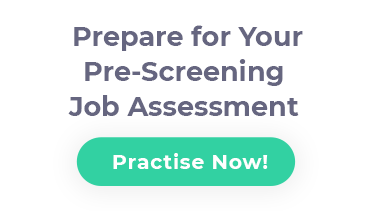Fujitsu Assessment Tests, Assessment Centre, Recruitment Process & Interview Questions Online Preparation – 2024

What Is Fujitsu?
Tokyo based Fujitsu is a technology company that produces computers as well as other electronics and computing tools. As of 2018, Fujitsu was the fourth largest IT company with 132,158 employees spread across 180 countries worldwide. Founded in 1935, they have the distinction of being the second oldest IT company in the world. Fujitsu’s business areas include technology solutions, device solutions, and ubiquitous solutions. They manufacture electronic devices, provide application service, cybersecurity, IT solutions, and other technological products and services. Fujitsu is making strides to focus on sustainability and eliminate its carbon emissions by 2050. They have also made a commitment to promoting a culture of diversity and inclusion, as well as providing a safe working environment for employees. As of now, Fujitsu has 18 subsidiary companies.
Fujitsu has employment opportunities in several different areas. Engineering, development, sales, finance, and manufacturing, there are opportunities for people with a wide range of career and educational backgrounds. There are graduate opportunities available as well as early career programs and apprenticeships. Employee benefits may vary by location, but some of the benefits offered by Fujitsu include:
- Medical and dental coverage
- Life insurance
- Paid time off
- Employee assistance programs
- Educational reimbursement
- Retirement savings
What Is Fujitsu’s Recruitment Process?
Application Process
If you are interested in a career with Fujitsu, you will need to start on Fujitsu’s UK website. You will be able to find postings for jobs local to you, as well as global opportunities. You can create an online profile to be notified when a job that matches your qualifications becomes available. When you fill out the online application you will need to include details of your education and past work experience. Once your application is received you will be notified by email. If your application matches the qualifications, you will be contacted by a recruiter. Fujitsu has spent a great deal of time shaping their brand, and their brand image, and are looking for talent that best demonstrates the values they want to instil in their company.
Fujitsu Psychometric Tests
Fujitsu uses online assessment tests as part of the hiring process, to streamline candidate selection. The assessment tests are tailored specifically to the job that is being tested for, to make sure the most qualified candidates are considered for that position. Fujitsu works in conjunction with Saville testing to identify the best talent.
- Verbal Analysis Test – This test is mainly targeted to graduates and applicants for management positions. The verbal analysis helps determine how well an individual can process complex written information. The test taker will be presented with several paragraphs they will need to read, along with follow-up questions based on the information they have just read. The test is timed, and depending on the position, and the level of difficulty consists of between 8 and 32 questions.
- Numerical Analysis Test – Many positions require an ability to be able to plot-graphs, and work with numbers. The numerical analysis will evaluate your ability to do this by presenting you with a table and a graph which you must use to answer each question. The test is timed, but the time will vary based on the number of questions on the test. Tests will differ by position.
- Diagrammatic Reasoning – Diagrammatic reasoning tests are made up of a panel of shapes, each of which is assigned a function. You must follow the rules to properly interpret each function and execute the command. These tests are used to help measure your analytical abilities and abstract reasoning skills.
- Situational Judgment Test – The SJT is a psychometric test used to build a profile of the type of worker the test taker is and interpret some of their behavioural patterns. You will be presented with various workplace scenarios and will need to select the answers that best describe your course of action.
Fujitsu’s Interview
Job-seekers who score well on the assessment tests and whose personalities match the job profile will be asked for an interview. The interview may be a brief in-person interview, or it may be done over the phone. The initial interview is used to verify your information and get a better sense of your experience level and motivation. The initial interview is a good time for you to ask any questions you might have about the position or the company. This benefits you by giving you a chance to serif it really is the right job for you and will show that you have an actual interest in the company, and don’t just want to be a place filler.
If you make a good impression during the screening interview, you will be asked back for a more in-depth behavioural style interview. Behavioural interviews focus on how you perform on the job if you can learn from your mistakes, and how well you work on in a team. They will ask you questions about previous experiences you have had on the job, and how those have prepared you for the role you are wanting to take on. When answering these questions, try to remember the STAR method. Situation, task, action, result. Explain the situation, describe the task you had to perform, what actions did you take? What was the result of all of this? This will help you give a thorough answer that gives the hiring manager enough information to form a thorough picture of how well you will function within their corporate culture.
Fujitsu’s Assessment Centre
Management and graduate applicants who make it through the interviews will be asked to attend an assessment centre. Assessment centres are used so candidates can be studied in a working environment using the necessary skills. The assessment day will be made up of several exercises, and a final interview. Some assessment test which you have already taken may be given. This is done to make sure the results do not differ very much from the results of your first round of assessments. The exercises that are done during the centre area combination of group and individual.
Common exercises include:
- Group Exercise – Group exercises vary in their content. You may be asked to role-play your position with the other candidates or take a look at a case study and find a solution. You may be asked to work together to build something or finish a puzzle. The point of these exercises is to see how each individual performs on a team. The hiring managers will be watching to see who has the ability to listen and take the opinions of others into account. Who exhibits innovative thinking, and even who tends to dominate other people in the group. Notes will be taken on all of this so they can make their eliminations leading up to the selections for the final interview.
- Presentation – Before the day of the assessment centre, you will be given a topic to present. This topic is typically something along the lines of “why are you the best fit for Fujitsu. You will be taken into a room with two hiring managers and a representative from HR, and you will have 3 minutes to give your presentation.
- Final Interview – Candidates will be given a break during which HR and the hiring managers will go over their notes and finalize their decisions. After the break, the candidates will be called back and told who will be staying for the final interviews.
How to Prepare for Fujitsu’s Psychometric Tests?
The first part of getting ready for the assessment tests is learning about the company. The more you know about Fujitsu, its company culture, and employee expectations, the better prepared you will be. Psychometric tests can seem challenging since there are technically no “wrong” answers, only answer that fit into certain profiles. Attempting to force your profile to fit what you think the company wants to see will make your results seem unbalanced and raise red flags. The best approach to these tests is to answer as if you are on the job. Let your professional brain take over since typically our responses to things at work differ from how we handle things in our professional lives.
Preparing for the reasoning tests is easy in comparison to the personality profile and situational judgment test. To prepare for these, practice any skills, like math, which you may feel have gone rusty. There are resources online to help you practice your number skills, and reading, reviewing your knowledge of synonyms and analogies, as well as doing word puzzles can help enhance your verbal reasoning ability.
When you sit down to take the tests, make sure you will not be disturbed. Since several of the assessment tests are timed, you do not want to lose precious seconds to distraction. Take the tests at a time when you will not be rushed, so you can give them all your focus. If you get stuck on a question, do not be afraid to guess. You will not be penalized for wrong answers.
Have confidence in yourself and your abilities. The assessment tests are just a stepping stone on your way to the interview process. Taking time to study so your skills are sharp and staying calm while taking the tests will help you show your skills and make it through the hiring process.

